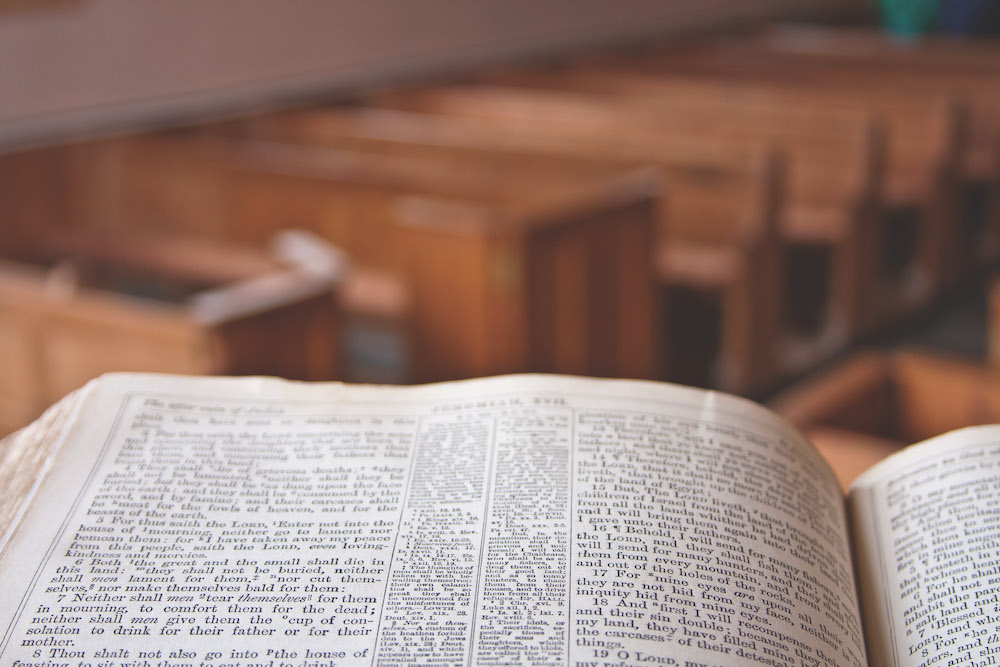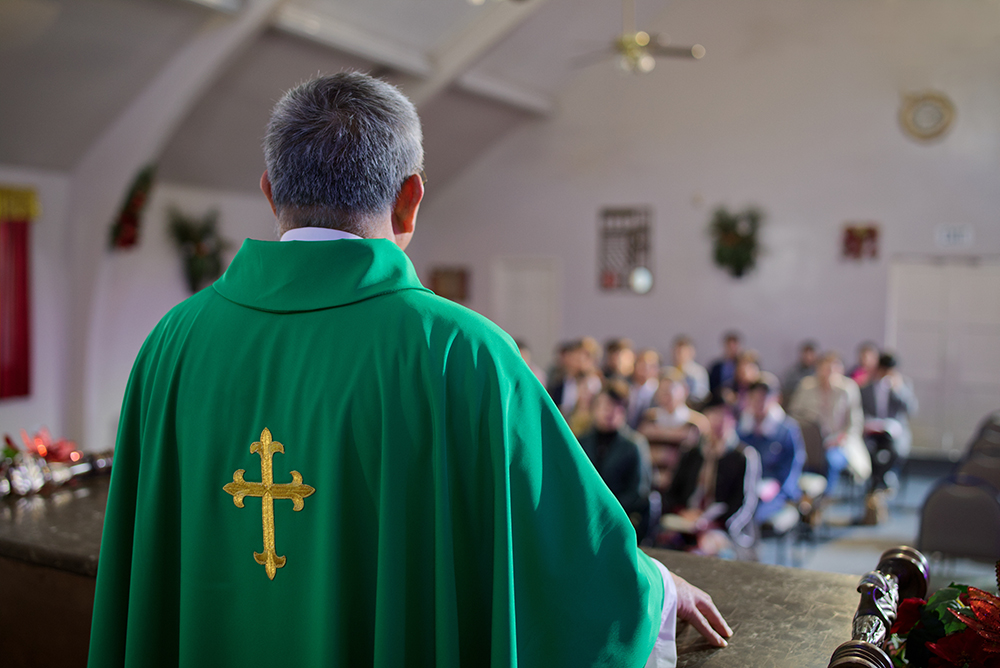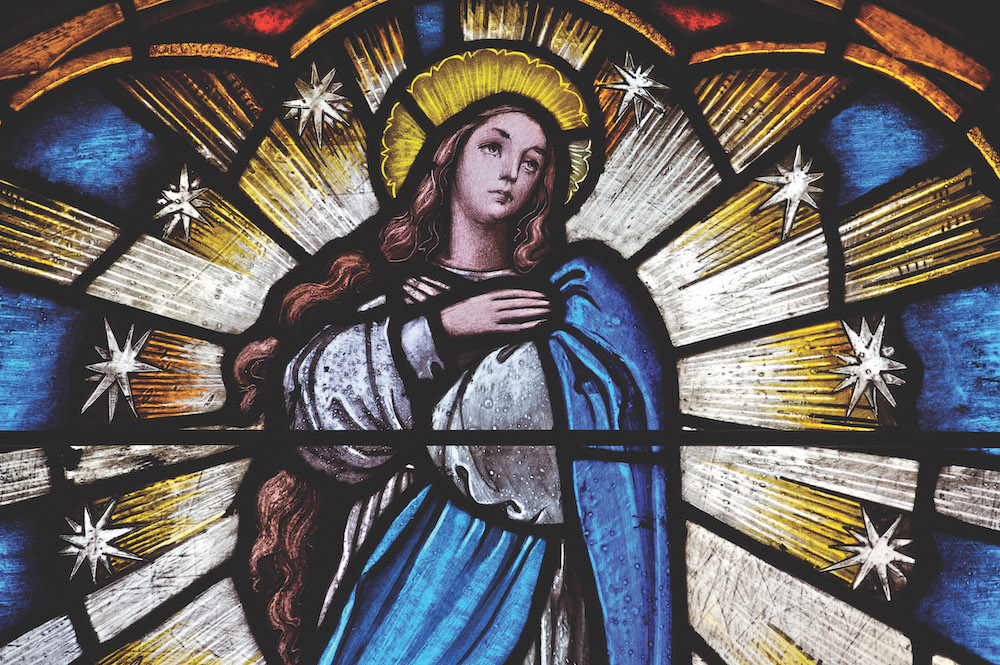Five Reasons to Celebrate Word of God Sunday
Father Guerric DeBona Comments Off on Five Reasons to Celebrate Word of God Sunday
When Pope Francis issued his apostolic letter Aperuit Illis, calling for an annual liturgical celebration of the Word of God to be observed on the Third Sunday in Ordinary Time, he was adding his own passionate signature to the Church’s tradition of honoring sacred Scripture. In my view, Francis asks the Church to bring into sharp focus five areas worth pondering from our contemporary horizon. These points hardly exhaust the richness of either the document or the occasion it asks us to commemorate but are highlights for those responsible for proclamation of the Word and the assembly of listeners who, like the Mother of God, are blessed to hear the Word of God and keep it (cf. Lk 11:28).
Unique Character
We know that the Church has a long history of insisting on the almost sacramental character of sacred Scripture and its interpretation. The conciliar and post-conciliar documents remind us that the Living Word is active, vibrant and working in our very midst. The Dogmatic Constitution on Divine Revelation, Dei Verbum, echoes the tradition when it comes to explicating our disposition before the Word of God, “with reverence, and proclaiming it with faith.” Mindful of the Second Vatican Council’s emphasis on Christ’s presence in his Word, the revised Lectionary further underlines the pride of place that the ambo holds as an integrated seat or thrown for proclamation, linked and joined to the altar at the Eucharist: the God who has been proclaimed will now be made known in Christ’s Paschal Mystery in both Word and Sacrament. Similarly, Pope Benedict’s post-synodal apostolic exhortation Verbum Domini (2010) showcases the enduring Word of God, which longs to renew the covenant the Lord has established with his people. Christ, as the Word made flesh in divine revelation “is the one, definitive word” given to us, as the Alpha and Omega.

The celebration of the Word of God on the Third Sunday in Ordinary Time positions itself as an intentional companion in the liturgical year; all three Lectionary cycles highlight Jesus’ own proclamation as the Word of God. In Year B, for instance, Christ opens the doors of the eschatological moment ushering forth the Word: “This is the time of fulfillment. The kingdom of God is at hand. Repent, and believe the gospel” (Mk 1:15). There is obviously an urgency about the way that Jesus proclaims the Kingdom, inherent in his very language: that the Kingdom is at hand prompts the believer to receive the reign of God ― not sometime in the future but, most crucially, now ― in our hearing. The Word of God becomes a hungry guest for the Christian disciple, knocking on our hearts, and is ready for entry at the edge of the present threshold of our household as we gather as Church.
No wonder the tradition has emphasized the living and active Word, present as Christ himself amid the gathered Christian assembly. The early monastics treasured this divine power of the Word in their hermitages and primitive cloisters and often asked for “a word” from a spiritual elder. Evagrius of Pontus established a series of scriptural quotations for monks, which could be used to combat the deadly sins ranging from lust to pride. These quotations anticipated the afflicted soul and recommended a scriptural antidote to deal with the problem. “Talking Back: A Monastic Handbook for Combating Demons” (Liturgical Press, $24.95) presents and uses Scripture to help us deal with sinful temptations. The monks knew very well that the Word was not merely static but a vibrant issuance from the mouth of God meant for our salvation.
Public Proclamation
In my homiletic classes at St. Meinrad, I remind the seminarians that when they are ordained to preach the Word of God they will be “pressing the reset button” for a congregation who has come to hear the telling of salvation history once again to renew them in faith, hope and love.
We are in good company. “For I handed on to you as of first importance what I also received: that Christ died for our sins in accordance with the scriptures; that he was buried; that he was raised on the third day in accordance with the scriptures; that he appeared to Cephas, then to the Twelve” (1 Cor 15:3-5). We might tend to forget that by and large many people live episodic lives and so the public proclamation of the Scriptures in the assembly of God’s saving action in human time throughout the ages is critical.
The Church gathers in gratitude to speak back to the Father, in Christ, what has been done for us. Proclamation attends to the local Church in history as a community of faith to hear the abiding story handed on to the Church of how God made the world, sent his own Son to redeem it and will bring creation to an end at the proper time. Proclamation of the Scripture is formative, although moving from private preoccupation to communal worship is an enormous stretch for everyone, including ordained ministers.
…………………………………………………………………………………………………………………………………………………..
Sacred Scripture as Living and Active
The pope’s “motu proprio” (on his own initiative) Aperuit Illis comes to us at a very crucial moment when our language has taken a historical turn in the contemporary lexicon. Social media injects a whole new set of problems when it comes to the status of language and its usage, well beyond the use of grammar and, indeed, our critical thinking. American society tends to live out of the spoken word in a variety of different ways, but our practical deployment of the word functions at a level that has taken on a life of its own.
Today it seems as if it is our ubiquitous gadgets and desire for instant communication that gives “life” to language, something that may question the very purpose of sacred Scripture as “living and active” in the present moment.
Francis has set his sights not on dismantling contemporary communication, however, but rather on encouraging the Church to be vigilant when it comes to the unique place that sacred Scripture has in our lives; it the life of the liturgy and the Christian people, even as we draw our own language of prayer from God’s Word.
—Father Guerric DeBona, OSB
…………………………………………………………………………………………………………………………………………………….
Does the assembly hear as a fellowship of baptized listeners or are they segmented into separate, albeit pious, believers? The experience of hearing the Word of God is meant to shape and form the congregation into the Body of Christ, even as the One Bread and One Body asks us to become attached to the living Christ in whose name we gather in worship.
Francis says, “As Christians, we are a single people, making our pilgrim way through history, sustained by the Lord, present in our midst, who speaks to us and nourishes us” (Aperuit Illis, No. 8). If the assembly is encouraged to hear deeply the fate of the Word in their midst, gathering them together as body, then their disposition to receive the Eucharistic Lord can be graced into both corporate and private worship.
Pope Francis showcases the crucial continuity of word and sacrament when he speaks of the “unbreakable bond between sacred Scripture and Eucharist” when discussing the Emmaus pericope in Luke 24:29. The passage also became a principle icon of hermeneutic illustration for the USCCB’s statement on preaching, Preaching the Mystery of Faith (2013).
Much like that document, Francis sees Christ’s activity proclaiming the Paschal Mystery to the discouraged disciples after the Crucifixion and Resurrection as the first exegete of the new order of salvation. “Not only did the Old Testament foretell what he would accomplish, but he himself wished to be faithful to its word, in order to make manifest the one history of salvation whose fulfillment is found in Christ.” (Aperuit Illis, No. 6).
Further, the U.S. bishops, in Preaching the Mystery of Faith, consider Christ’s interpretation of salvation history and the disclosure of himself in the breaking of the bread as paradigmatic of the homiletic event. Surely, we can imagine today a discouraged and confused congregation, longing for meaning and understanding and waiting to discover themselves anew in the Eucharistic body. Indeed, in Fulfilled in Your Hearing (1982), the crucial antecedent to Preaching the Mystery of Faith, Jesus’ proclamation of the Word and its fulfillment in his public proclamation and interpretation of Isaiah in Luke 4:16ff underlines yet again the crucial aspect of Christ’s investing himself into salvation history, in which the congregation would be, as he tells them, memorably, “fulfilled in your hearing” (4:21).
The Lord witnesses to the public proclamation of the Scriptures as a turning point in history. We ought not to miss the direct invitation here to the gathered assembly precisely as hearers, the ones who become knitted together as the Word fulfills his divine mission to come to earth without leaving it void and empty. This is a moment of graced hermeneutics like no other: The homily preached through the Scriptures notably witnesses to the hearers in the assembly as a fulcrum between Word and Sacrament, which Sacrosanctum Concilium says remains “part of the liturgy itself” (No. 52)
Crucial Witness
I wonder how many of you who are reading these pages were first called to priesthood by a desire to preach. For many, priestly ministry is made of many different and worthy activities, which hold compelling attractions for a variety of people. Preaching is not always first on everyone’s list. Yet as we know from the Rite of Ordination, the first responsibility of the priest is “to preach the Gospel.” It will take a lifetime to lean into the ministry of preaching, and I encourage every priest, permanent deacon and seminarian to develop a “theology of preaching” out of which he might carve the vocation to proclaim the Gospel in mission in the context of the local Church. Our theology of proclamation in the homily will evolve over time, of course, depending on the pastoral needs of the parishes to whom we minister.
Pope Francis demonstrates in Aperuit Illis and elsewhere in his writings a fervent desire for addressing the pastoral needs of the parish with the homily. He expresses at length in Evangelii Guadium that the homily has a very particular function, for it contains “a quasi-sacramental character” (No. 142), which helps people to enter more deeply into the word of God through simple and suitable language. But that encounter with the Scriptures is not meant for the hearers only, but also for the preacher himself, the first of these listeners, to discover “the beauty of the images used by the Lord to encourage the practice of the good” (Evangelii Gaudium, No. 142).

He goes on to say that the homily is a pastoral “opportunity that should not be wasted” (Aperuit Illis, No. 5). He implores preachers to devote time to the preparation of the homily, avoiding rabbit holes and useless digressions and abstractions. Most of all, the homily emerges from the prayerful meditation of the Scriptures, “conveying what is essential and capable of bearing fruit” (No. 5) through preaching. It stands to reason that if we are celebrating the Word of God Sunday, then engaging the congregation in proclamation for the rest of the year is essential.
It should seem obvious that the homily that fails to account for the body of listeners in the congregation will not be able to unfold the Word effectively. The homily may be a nice personal meditation, but will the Scriptures be “fulfilled in [their] hearing” or just the preacher’s ears? If the sower spreads the seed of the Gospel, will it fall on rocky ground, thorny brambles, scorched earth or rich soil? If the preacher has understood and exegeted his congregation, he will literally know his terrain.
The bishops’ Fulfilled in Your Hearing uses a classic expression to identify the good preacher — “the mediator of meaning.” The homily dares to interpret the Scriptures for the collective ears of a new, diverse congregation, adapting for the “signs of the times,” through interpretive strategies that are as vibrant and as living as the Word of God itself.
Francis quotes Jesus’ advice on reading parables, which might serve as an avenue of understanding the task of the preacher, “Every scribe who has been instructed in the kingdom of heaven is like the head of a household who brings from his storeroom both the new and the old” (Mt 13:52).
Fostering Dialogue
The Word of God Sunday arrives during the same time frame that we celebrate the Octave for Christian Unity. This might just be a majestic alignment of the stars witnessing the Kingdom. As we pray for the Spirit to lead us into a cultural encounter with others who believe in the same Christ as word, we must acknowledge the place Scripture has in setting the table for us in this conversation.
Pope Francis reminds us: “The role of the Holy Spirit in the Scriptures is primordial. Without the work of the Spirit, there would always be a risk of remaining limited to the written text alone” (Aperuit Illis, No. 9). When we discuss the Scriptures with others, it is well to remember that the Spirit is living and active as we are guided in love and mercy to receive with openness how others read the text. “To listen to sacred Scripture and then to practice mercy: this is the great challenge before us in life. God’s word has the power to open our eyes and to enable us to renounce a stifling and barren individualism and instead to embark on a new path of sharing and solidarity” (No. 13). We often speak of a polarized society, a divided Church. Then the Word of God becomes the narthex around which we gather to learn to bear one another’s burdens for the sake of Christ and in what Francis calls a “culture of encounter.”
Prophetic Tradition
When we meet the Word in prayer, then we come face to face with what Francis identifies as the prophetic work of Scripture stirring up within us the taste of “the bitter and the sweet.” He says that, “Sacred Scripture accomplishes its prophetic work above all in those who listen to it. It proves both sweet and bitter” (No. 12), echoing Ezekiel, and St. John the Evangelist on Patmos. The sweetness of the Lord’s word finds itself in the sharing of common meaning and symbol and hope with those who are desirous of finding common ground at the table of the Word. But there is bitterness we discover as well, which also partakes of the prophetic tradition of receiving the Word of God because it “often comes from our realization of how difficult it is to live that word consistently, or our personal experience of seeing it rejected as meaningless for life” (No. 12).
Clearly, the prophetic tradition of the Old Testament witnesses to the conversion God requires in order to walk in fidelity to the covenant. But perhaps the most vivid example of the prophetic encounter with the Word of God comes to us in 2 Kings 22:8ff when Hilkiah finds the scroll of the Law (likely a portion of the Book of Deuteronomy) during the reign of King Josiah of Judah. The discovery disclosed how far the Chosen People had drifted from the demands of the Law of Moses. The living word was a cause for bitterness for King Josiah, who initiated a reform to reestablish the practices which had been lost.
…………………………………………………………………………………………………………………………………………………
A Church That Goes Forth
In Evangelii Gaudium, Pope Francis writes: “The Church’s closeness to Jesus is part of a common journey; ‘communion and mission are profoundly interconnected.’ In fidelity to the example of the Master, it is vitally important for the Church today to go forth and preach the Gospel to all: to all places, on all occasions, without hesitation, reluctance or fear. The joy of the Gospel is for all people: no one can be excluded. That is what the angel proclaimed to the shepherds in Bethlehem: ‘Be not afraid; for behold, I bring you good news of a great joy which will come to all the people’ (Lk 2:10). The Book of Revelation speaks of ‘an eternal Gospel to proclaim to those who dwell on earth, to every nation and tongue and tribe and people’ (14:6)” (No. 23).
………………………………………………………………………………………………………………………………………………….
The more prosperous countries might find themselves in a similar situation when it comes to unearthing the Word as if we would stumble on the Beatitudes and hear the call for God’s righteousness and justice for the first time. Scripture is filled with God’s “preferential option for the poor,” beginning with his own Incarnation.

Francis invokes the model of Mary, Book of the Living Word, as our inspiration to receive the Gospel in faith and love. “Mary’s own beatitude is prior to all the beatitudes proclaimed by Jesus about the poor and those who mourn, the meek, the peacemakers and those who are persecuted, for it is the necessary condition for every other kind of beatitude. The poor are not blessed because they are poor; they become blessed if, like Mary, they believe in the fulfillment of God’s word” (Aperuit Illis, No. 15). Luke allows us to seek Mary’s humble welcoming of the word in sweetness at the Annunciation. But the prophetic utterance of the Magnificat at the Visitation suggests that the word of God has transformed the world to “lift up the lowly.”
An honest question put before those gathered to celebrate Word of God Sunday is exactly this: What is the Living Word asking me to do, now that I have conceived the Lord in the midst of the assembly? If we say that the word of the Lord is near to us (cf. Dt 30:14) then the Eucharist has disclosed just how near Christ has come. Even at the beginning of Ordinary Time, the Word has been made flesh.
FATHER GUERRIC DeBONA, OSB, is a professor of homiletics and director of spiritual formation at St. Meinrad Seminary and School of Theology.
…………………………………………………………………………………………………………………………………………………..
Pastoral Dialogue and Extending Hospitality
The proclamation of the Word has no limits. Can we extend hospitality to find common ground with others with whom we might initiate pastoral dialogue? Absolutely.
Weekly gatherings of parishioners with the pastor that focus on the next Sunday’s readings are invaluable, first and foremost as a window into the lives of others. When people are invited to share their thoughts of biblical stories and symbols it grants them permission to disclose some hidden portion of themselves that they might not reveal under other circumstances.
Such parish groups also may contribute to the homily itself by giving the preacher a reading of the Scriptures that might differ substantially from his own. That exchange invites a challenge to see the Word as introducing another’s perspective by the gift of the Spirit.
These pastoral encounters could also occur after the homily is preached, which obviously offers valuable feedback. How did the assembly hear the homily? Did they grasp a particular sentence, or what the late Bishop Ken Untener called “the pearl” of the text? If I had consistent feedback as a preacher, might I then prepare the homily so that the hearer really grasped the core that has emerged in my prayerful and pastoral pondering of the Word?
Moreover, the Scriptures clearly invite a conversation with other Christian denominations. After teaching preaching for 25 years, I can tell you that I have learned more than I can say from my colleagues in other faith traditions. Their writings on sermon methodology, their discussions of numerous social and theological issues have helped me to understand the Scriptures exponentially. I know that there are several Catholic pastors who meet regularly with ministers and rabbis who serve locally in their area. What a way of not only inviting diversification of readership in the Scriptures but collaborating in ecumenical and interfaith, lifelong learning!
…………………………………………………………………………………………………………………………………………………





